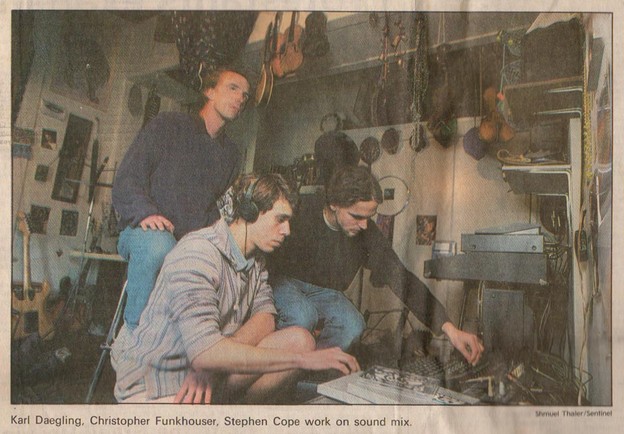In audio practice II
We Press

Contents of my or anyone’s recording archive result from milieu and surroundings. My collection reflects networks assembled through connections fused at Naropa (who has their own superb Poetics Audio Archive) and We Press at the foundation; its reach expands during my years in Albany, and continues to grow through my research in the field of electronic literature.
I co-founded We Press with Ted Farrell, a friend who I lived with during a year of graduate school at Virginia (1986-87). We was inspired by Anne Waldman’s proclamation, in a class a class of hers I attended at Naropa, that all young writers must start a magazine, to build networks and be engaged most fully (not only as writers but as readers, correspondents, and broadcasters of contemporary work). Over the years, several friends and I worked as co-editors; Jimo Thomas, Angela Coon, Stephen Cope, Eric Curkendall, Karl Daegling, Katie Yates, James Garrison, Richard Loranger, Belle Gironda, Amy Hufnagel, and others contributed significantly. The first 10 issues—published in Charlottesville, Berkeley, and Santa Cruz—were printed. At a certain point, following my own affinities and also hearing convincing calls to “seize the media”, it made sense to do audio editions, especially since after moving to Santa Cruz I was very fortunate to connect and become friends with a group of musicians, some of whom were also interesting poets, who had access to decent recording gear.
We has published three audio editions, a VHS issue, and two online (1993, 2007). At first (Issue 11, 1989), the entire production was DIY. Living with Rich West in Soquel, in a house where Wrestling Worms and other bands rehearsed, I collected cassettes from people who were connected to or aware of the project, mastered everything via our home stereo, and then dubbed 100 or so copies for circulation in our living room. Fortunately, this effort in part led to We Press receiving grants from the California Arts Council and Cultural Council of Santa Cruz County to do a CD, Issue 14, featuring California poets. In 1990-91, Daegling and I, along with Cope’s input, began to invite writers we knew, or who were interested, to our home studio (Aardvark) on the corner of Washington and Lincoln Streets in Santa Cruz. Daegling owned 1/4” 8-track (analog) deck and knew how to use it well, so we could multi-track poets with musicians. With grant funds we bought a DAT deck for mixing and mastering. Our productions were collaborative, for sure, but it’s for certain that Daegling was often pressing the buttons, adjusting levels, setting up mics—and basically everything I know about those necessities I learned from him. He recently passed away, and We are very sad that he is not around to enjoy the online launch of these recordings and again celebrate the fantastic time we had making them.
A lot of poets and musicians came through, and I learned a tremendous amount about audio production along the way; Cope, Daegling, and I were also bandmates together in thelemonade, where we also collaborated with many poets and musicians. Grants only covered about one-third of our CD production costs, but my mother, ever a patron of the arts, supported our efforts by investing in the rest. We had recordings left-over from the CD sessions, along with new recordings, and a year later produced a cassette issue (xv), and the following year, the video (We 18). Although the cost of the CD was fairly exorbitant at the time, we managed to accomplish a lot on a short shoestring budget, and I am proud these recordings exist—as a type of time capsule and testimony to the diverse poetic efforts and spirits of those who were involved.
In audio practice